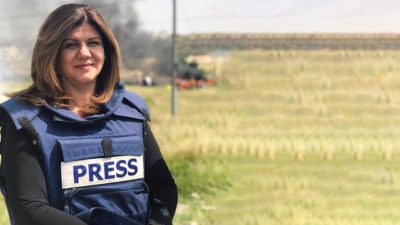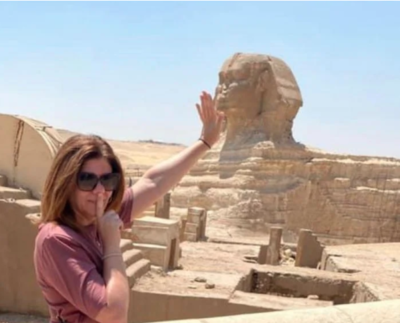A name has been on everyone’s lips for the past few days, whether a media professional, a person from, living or interested in the Arab world. That name is Sherine Abu Aqleh.
Her killing while reporting from the field, as well as the violent outburst at her funeral considerably moved people on a global scale. Her relentless dedication to reporting on the ground, her determination and being one of the very few women in her profession made her an important and beloved symbol of hope. This article pays tribute to her and gathers testimonies of several voices from the Arab world.
In a nutshell
On 11 May 2022, Sherine Abu Aqleh, a 51-year-old veteran Palestinian-American correspondent for Al Jazeera – the Qatar-based news channel-, was killed. She was shot while covering Israeli army raids in Jenin, a Palestinian city located in the northern West Bank. Jenin hosts a UNRWA-run refugee camp of around 14,000 people (2005), founded in 1953 by Jordan to house displaced Palestinians who fled or were expelled during the 1948 War, and had seen an outburst of tensions lately. Another Al Jazeera journalist, Ali al-Samoudi, was wounded by a bullet in the back at the scene and is now in stable condition.
Who was she
Shireen Abu Aqleh was born in 1971 in Jerusalem and belonged to a Christian family. She obtained a BA in Journalism and Mass Communication from Yarmouk University of Jordan, majoring in written journalism. After her graduation, she returned to the Palestinian territories and worked in several media organisations, including Voice of Palestine Radio and Amman Satellite Channel. She joined Al Jazeera in 1997 and was one of its first field correspondents.

© BBC
She was one of the best-known women to make a regular appearance on TV, covering the Israeli-Palestinian conflict over the years: the second intifada (Palestinian uprising against Israel in 2000-05), the Israeli siege of Jenin in 2002, the death of Yasser Arafat, as well as many West Bank raids.
Who is to blame
Videos have been circulating from moments after Sherine Abu Aqleh’s shooting, showing she was wearing both a helmet and a bulletproof vest with “press” written on it when she was shot.
Israelis and Palestinians are trading blame. According to witnesses, the Palestinian health ministry and her employer, she was hit by Israeli army fire. Al Jazeera said she was shot “deliberately” and “in cold blood” by Israeli troops. Meanwhile, Israel’s prime minister said it was “likely” they were shot by Palestinian gunmen during an exchange of fire, and other Israeli officials stated she could have been struck by either Palestinian or Israeli fire. Until a proper examination is conducted, doubts remain on the exact circumstances of her death, and who, or which side, is to blame.
From a journalistic and political point of view, it is interesting to read how different media from around the world have worded their headlines, from most neutral to most vocal:
The BBC: “Al Jazeera reporter killed during Israeli raid in West Bank”
The Guardian: “Shireen Abu Aqleh killing: She was the voice of events in Palestine”
Egypt Today: “Shireen Abu Akleh: Who is Al-Jazeera correspondent killed in Jenin?”
CNN Business: “Shireen Abu Akleh, journalist killed in the West Bank, was ‘the voice of Palestinian suffering’”
Al Jazeera: “Shireen Abu Akleh: Al Jazeera reporter killed by Israeli forces”
Citizen TV Kenya: “Al Jazeera journalist Shireen Abu Akleh shot dead by Israeli forces”
Why the accrued tension

© CNS photo/Ammar Awad, Reuters
There was a burst of violence at her funeral on 13 May. As thousands of Palestinians were gathered in East Jerusalem – a predominantly Arab neighbourhood –, to pay their respects, the Israeli riot police assaulted a group of mourners carrying the coffin containing Sherine Abu Aqleh’s body. They fired tear gas as people tried to carry her coffin outside the hospital’s morgue, causing them to almost drop it. Israel had requested to limit the size of the funeral procession and that no Palestinian flags should be displayed and no slogans chanted. This warning proved difficult to heed given the outpouring of grief and anger over the killing. The police intervention drew shock and condemnation worldwide.
Words of love and admiration…
Sherine Abu Aqleh reported about the plight of Palestinians under Israeli occupation for over two and a half decades. She was an extremely beloved reporter, one of the region’s most experienced, providing information, a voice, and hope to a whole generation of Palestinians who grew up seeing her on their TV screens. Here are testimonies from young people from/living in the Arab world.
… from childhood
“I remember when she covered an Israeli invasion in my small town, at the south of Hebron, during the 2nd intifada in 2000,” says A., a Palestinian Ph.D. student in History. “I was around 7, but I still remember how happy people were because she was the one to cover that incident.”
“She was on the field with her cameraman, and we could hear attacks behind her: she was not scared,” says M., a French-Syrian HR Manager.
“She is really part of my childhood,” says D., a Palestinian lawyer. “Around the 2nd intifada, I was 10 years old. What she did was so courageous, it was unsafe to be in the street, so imagine being there for so many hours. The testimonies from people saying that she was joining them searching for the dead bodies of their sons and daughters, specifically where she died, in Jenin camp, made my heart so warm but also broke it.”
… for a role model
“Sherine represents to me what a reporter and a journalist should be: passionate, honest, strong, courageous, brave, scared of nothing to show to the world what is going on in the field,” says M. “She never gave up even if Israelis were harsh with her so many times. She had such a big heart that everybody loved her, Muslims and non-Muslims, Arabs and non-Arabs. She was so respected. She represented the success of a Middle Eastern woman in the world.”
“I felt something die inside me when I received a message of my friends saying that she died,” says D. “She represents the voice that a Palestinian can have to the world, by a Palestinian who is actually living the tiniest details of a Palestinian life. She was the honest voice, humble, professional, somebody who can be balanced no matter what. A visionary.”
… in one word
“If I had to choose one adjective to describe Sherine, it would be ‘brave’,” says A. “She devoted her life to expose the occupation crimes, despite all the risks and threats.”
“For me it would be ‘human’,” says D. a Palestinian lawyer. “She is what I hope everyone that call themselves human is like. Doing the same thing over and over again for nearly a quarter of a century without doubting or questioning that they are on the right path.”
… as a farewell
“I want to tell her thank you for being devoted that much to your message. It has been received by the whole world, even through your death. You’re a legend that will never die,” says A.
“I would tell her thank you for everything, and that nobody will forget you, whether or not they are Muslim,” says M. “We are so proud to have you, the voice of Palestinians of the Arab world.”

© egypttoday.com
“I wish I knew her on a personal level. I would tell her the Arabic word ‘nialek’, meaning ‘I envy you’ (also “lucky you”, editor’s note). It is amazing when someone can be this stubborn about their vision. They have an impact, not because they want to make an impact for their own selfish reasons, it’s very selfless. She was the person that gave me another hope,” says D. “Thank you, I look up to you.”
During her lifetime, Sherine Abu Aqleh once said: “I chose journalism to be close to the people, it might not be easy to change the reality, but at least I could bring their voice to the world”. She certainly exceeded expectations in that regard and inspired many other people, both through her life and death. I am one of them.
Cover image credit: Mohammed Abed/AFP

